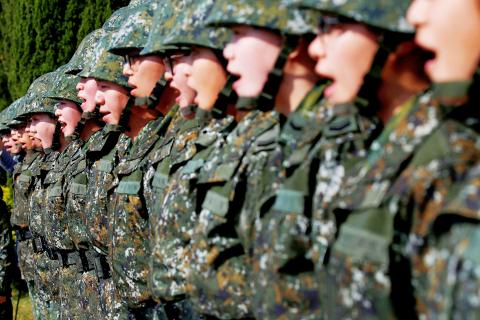Production of Tien Kung III (“Sky Bow III”) and Hsiung Feng III (“Brave Wind III”) missiles should be sped up, provided that quality is not affected, President Tsai Ing-wen (蔡英文) said yesterday, adding that higher production rates are needed as the Chinese military threat grows.
Tsai made the remarks during a visit to the Chungshan Institute of Science and Technology with National Security Council Secretary-General David Lee (李大維), Minister of National Defense Yen De-fa (嚴德發) and Chief of General Staff Lee Hsi-ming (李喜明) to boost morale among research staff.
The officials were briefed on the mass production of missiles before inspecting the facility.

Photo: Tyrone Siu, Reuters
This year marks the 50th anniversary of the institute’s founding and personnel should be commended for embodying the founding spirit of the institute: to ensure Taiwan’s defense autonomy and national security in the face of changing external circumstances, Tsai said.
The Tien Kung III and Hsiung Feng III missiles, which help Taiwan maintain a formidable defense, are the pride of the institute, but their success is due to the diligence of generations of researchers, Tsai said.
“The institute’s researchers laid the foundation for its success by daring to brave the challenges they faced and learning from their failures,” she said, citing the institute’s motto: unwavering patriotism, innovative creativity, pragmatic application of the scientific method and the spirit of teamwork.
As the commander-in-chief of the armed forces, Tsai said she is well aware of the institute’s importance and has increased its funding.
She said she has also sought to improve relations between the institute and the Ministry of National Defense to ensure that the institute’s knowledge would find suitable applications.
Tsai called on Yen, who doubles as the institute’s chairman, and Deputy Minister of National Defense Chang Kuan-chun (張冠群) to carefully plan the future development of the institute, focusing on expediting the manufacturing of quality missiles.

A drunk woman was sexually assaulted inside a crowded concourse of Taipei Railway Station on Thursday last week before a foreign tourist notified police, leading to calls for better education on bystander intervention and review of security infrastructure. The man, surnamed Chiu (邱), was taken into custody on charges of sexual assault, taking advantage of the woman’s condition and public indecency. Police discovered that Chiu was a fugitive with prior convictions for vehicle theft. He has been taken into custody and is to complete his unserved six-month sentence, police said. On Thursday last week, Chiu was seen wearing a white

EVA Airways, one of the leading international carriers in Taiwan, yesterday said that it was investigating reports that a cabin crew manager had ignored the condition of a sick flight attendant, who died on Saturday. The airline made the statement in response to a post circulating on social media that said that the flight attendant on an outbound flight was feeling sick and notified the cabin crew manager. Although the flight attendant grew increasingly ill on the return flight, the manager did not contact Medlink — a system that connects the aircraft to doctors on the ground for treatment advice during medical

The Taoyuan Flight Attendants’ Union yesterday vowed to protest at the EVA Air Marathon on Sunday next week should EVA Airway Corp’s management continue to ignore the union’s petition to change rules on employees’ leave of absence system, after a flight attendant reportedly died after working on a long-haul flight while ill. The case has generated public discussion over whether taking personal or sick leave should affect a worker’s performance review. Several union members yesterday protested at the Legislative Yuan, holding white flowers and placards, while shouting: “Life is priceless; requesting leave is not a crime.” “The union is scheduled to meet with

‘UNITED FRONT’ RHETORIC: China’s TAO also plans to hold weekly, instead of biweekly, news conferences because it wants to control the cross-strait discourse, an expert said China’s plan to expand its single-entry visa-on-arrival service to Taiwanese would be of limited interest to Taiwanese and is a feeble attempt by Chinese administrators to demonstrate that they are doing something, the Mainland Affairs Council said yesterday. China’s Taiwan Affairs Office (TAO) spokesman Chen Binhua (陳斌華) said the program aims to facilitate travel to China for Taiwanese compatriots, regardless of whether they are arriving via direct flights or are entering mainland China through Hong Kong, Macau or other countries, and they would be able to apply for a single-entry visa-on-arrival at all eligible entry points in China. The policy aims